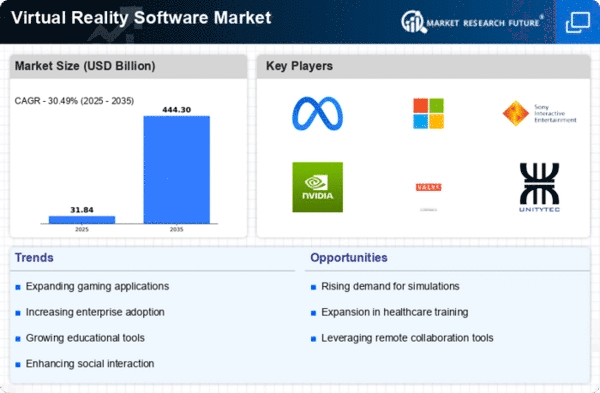Top Industry Leaders in the Virtual Reality Software Market

Virtual Reality Software Market: News and Updates
The veil between reality and the virtual is thinning, with Virtual Reality (VR) software emerging as a transformative force across diverse industries. This report delves into the dynamic landscape of the VR software market.The VR software market is experiencing a surge as VR technology matures and applications expand beyond gaming.
Some of Virtual Reality Software Companies Listed Below:
- Google Inc - USA
- Microsoft - USA
- Blippar Inc - United Kingdom
- Pixologic Inc - USA
- Metaio GmBH - Germany
- Qualcomm Inc - USA
- Oculus VR Inc - USA
- Worldviz - USA
- Starbreeze studios - Sweden
- Razer Inc - Singapore
- HTC Corporation -- Taiwan
- BAE Systems AB - Sweden
Strategies Fueling Growth:
-
Content Diversification and Focus: Moving beyond gaming, focusing on VR content for education, training, marketing, and design expands market reach and attracts diverse user segments. -
Cross-Platform Compatibility: Ensuring compatibility with major VR platforms (Oculus, SteamVR, PlayStation VR) increases accessibility and broadens potential user base. -
Focus on User Experience and Accessibility: Developing user-friendly interfaces, intuitive controls, and comfortable hardware creates a seamless and enjoyable VR experience. -
Enterprise Adoption and Integration: Building business-focused VR solutions and seamless integration with existing enterprise tools accelerates adoption within corporations.
Market Share Decoding: Key Factors to Consider
-
Technological Innovation and Feature Set: Platforms offering advanced features like real-time rendering, physics simulations, and multiplayer capabilities hold an edge. -
Ease of Use and Development Tools: User-friendly development tools and intuitive interfaces ease VR development, attracting both professionals and hobbyists. -
Content Library and Ecosystem: Platforms with a diversified and high-quality content library attract more users and developers, fostering a growing ecosystem. -
Price and Scalability: Offering flexible pricing models and scalable solutions cater to diverse budget constraints and project needs.
New and Emerging Stars: Illuminating the VR Path
-
Cloud-Based VR and Streaming: Companies like VRdirect and Shadow are exploring cloud-based VR streaming, making high-end VR experiences accessible without expensive hardware investments. -
Haptic Technology and Sensory Feedback: Startups like HaptX and Dexta Robotics are developing advanced haptic technologies that enhance immersion and realism in VR experiences. -
Social VR and Virtual Collaboration: Platforms like Sansar and AltSpaceVR are pioneering social VR spaces, enabling virtual meetups, conferences, and collaboration in immersive environments.
Investment Trends: Where the Capital Flows
-
AI and Machine Learning Integration: Investments are pouring into building AI-powered VR tools for automated scene creation, character animation, and dynamic content generation. -
AR/VR Convergence and Mixed Reality: The lines between augmented reality (AR) and VR are blurring, leading to investments in platforms that bridge the gap and offer mixed reality experiences. -
Focus on Healthcare and Enterprise Applications: As VR adoption grows in healthcare and enterprise sectors, investors are backing companies developing VR solutions for medical training, product design, and remote collaboration. -
Content Development and Studios: Investment in VR content creation studios and platforms is increasing, fueling the development of high-quality and engaging VR experiences across diverse genres.
Latest Company Updates:
-
December 27, 2023: Meta announces the launch of "Horizon Workrooms 2.0," offering enhanced collaboration features and virtual office environments. -
November 15, 2023: HTC Vive launches its "Vive Focus 3" standalone VR headset, targeting enterprise and professional users. -
October 24, 2023: Unity Technologies acquires visual effects company Weta Digital, bolstering its VR creation tools and assets.










